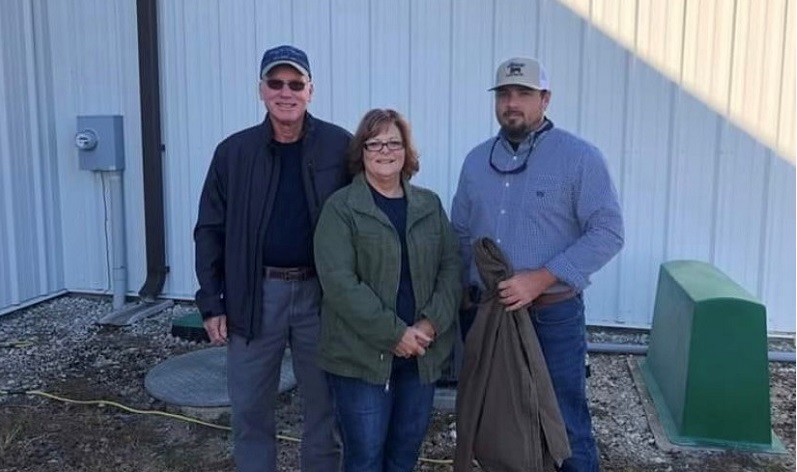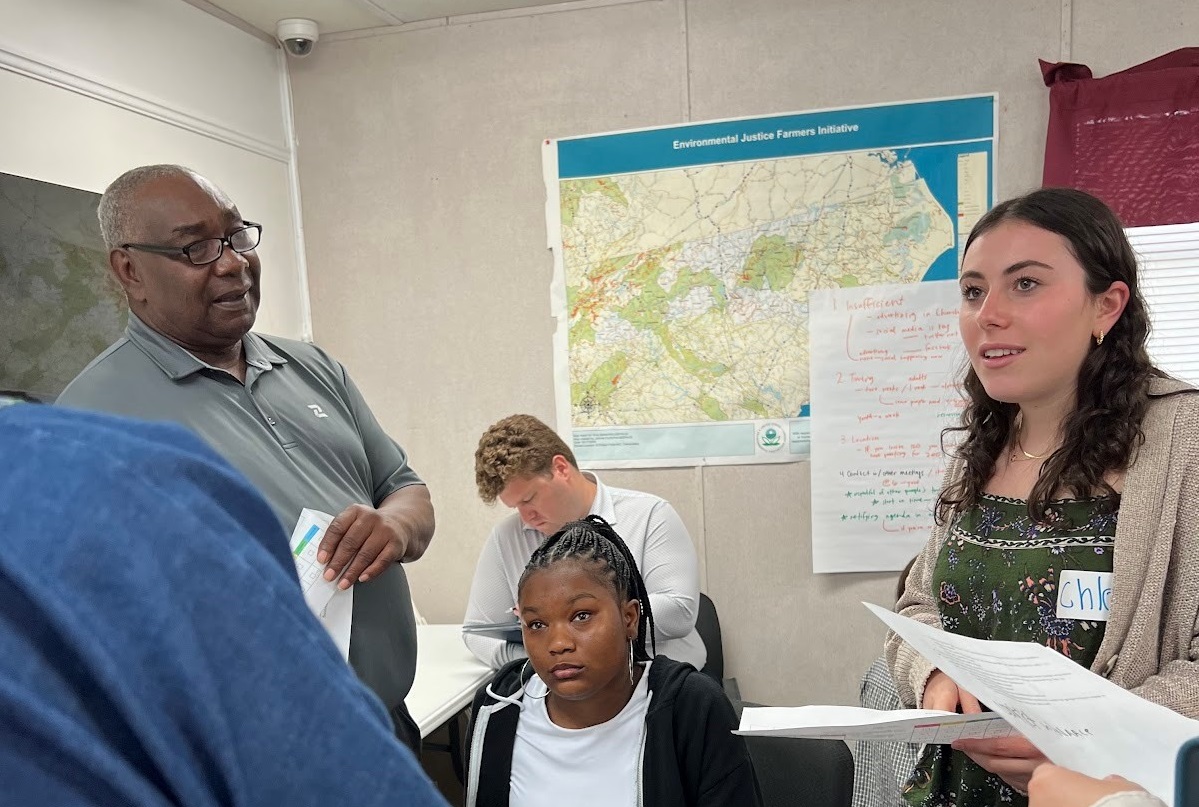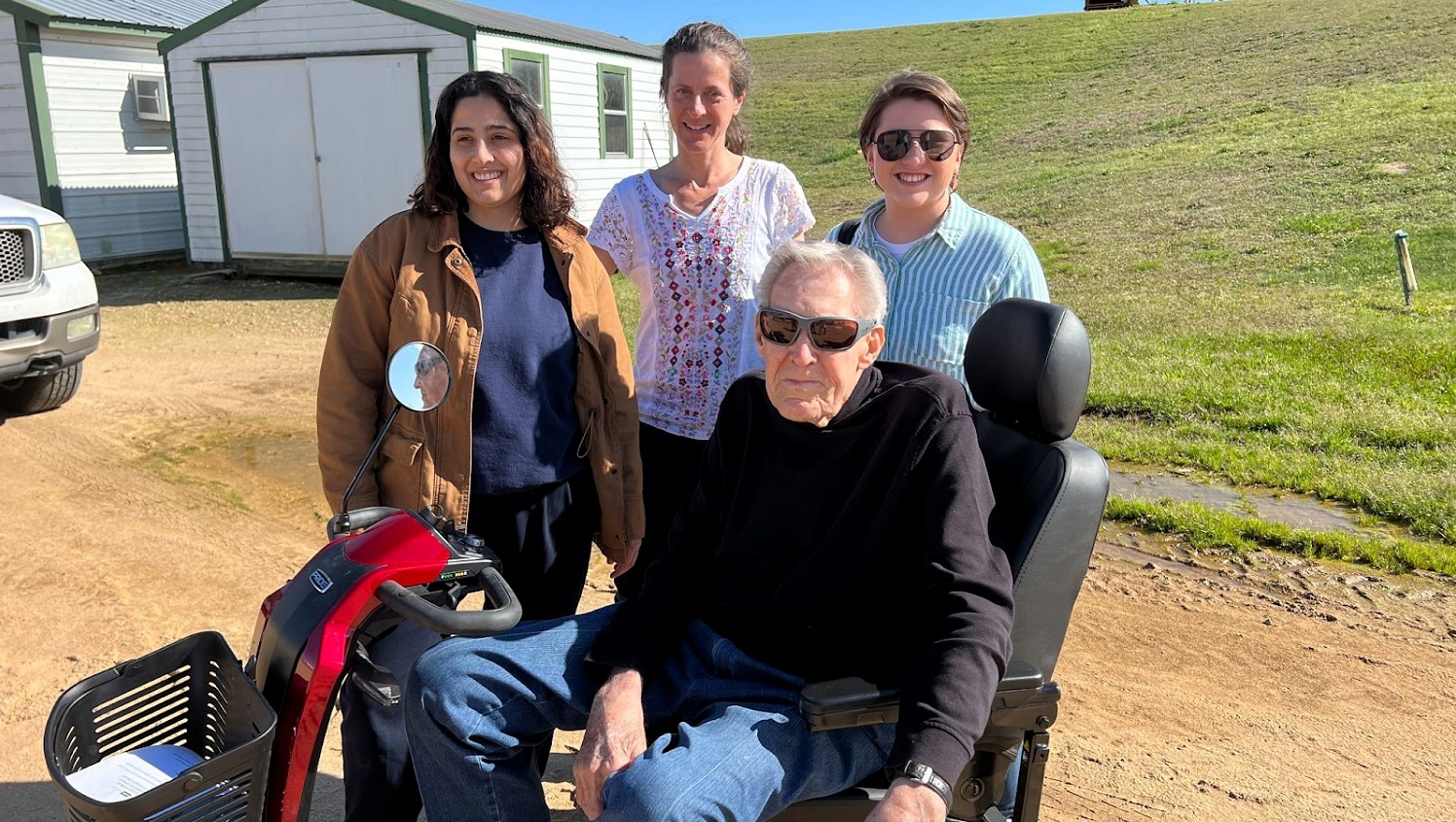Interview: Filmakers of “An Outrage: a documentary film about lynching in the American South”
This post is an interview with NC State History MA Student Andrew Sperling and filmmakers Lance Warren and Hannah Ayers.
Lance Warren studied history and politics at Syracuse University and Brandeis University, focusing on civil rights and social justice in the twentieth century United States. Hannah Ayers studied at the College of William & Mary and Columbia University, with experience in history, nonprofit development and multimedia storytelling. Both natives of Virginia, Lance and Hannah won the Audience Award for Best Short Documentary at the 2010 Virginia Film Festival for their film That World is Gone: Race and Displacement in a Southern Town. On September 19, 2017, they screened An Outrage for history students and interested visitors at NC State.
AS: I want to start out by asking about filmmaking. What is it about this medium that best elucidates the messages you’re trying to convey? Why does film stimulate discussion in ways that other modes of communication may be incapable of doing?
LW: Something’s that really important to us as filmmakers is taking people to places that are hard to see. They may be hard to see because they are unauthorized spaces, they may be hard to see because they are inside families, or in the case of this film, they are hard to see because it’s a past that’s been forcibly forgotten, long hidden, and a past that many families have wanted to hold closely. The weight of the memories is very painful to bear. We had the very special opportunity to connect with families who had ancestors who were victims of lynching, with activists working to memorialize this history and they were willing to bring us into their homes and towns and indeed their lynching sites to share their personal connection to this past. That’s something that you can’t accomplish through bulletpoints, through statistics or through numbers alone. And that’s something that we think and hope that when paired with images from lynching sites which look bracingly contemporary, have the potential to move someone and worm their way into somebody’s memory in ways that numbers cannot.
AS: Specifically about an An Outrage, how did this idea come to you? How did you conceive of this and what hesitations did you have before going into that process?
HA: A couple things happened at the same time. Before becoming full-time filmmakers we were working with history teachers, running a program for history teachers and along the way we were hearing history lectures and the theme of lynching came up multiple times. We realized the history of lynching was something both of us had very little knowledge of and that’s despite the fact that I studied history in college, and Lance studied history in college and grad school. What we learned was a very integral piece of American history had been missed in our educations. And so we went looking for what media exists about lynching and what we found was either very dated or offensive or nonexistent. Around this same time the Equal Justice Innovative issued their report “Lynching in America,” documenting more lynchings than had been documented ever before at that point at nearly 4000 lynchings. Subsequent research has documented nearly 5000. And we were very struck by the scale and the scope and that report got lynching back into the headlines. What we were compelled by, what we asked ourselves, was what are the human stories behind those numbers? I don’t think we had much hesitancy because when we realized this was a hidden history, and we could maybe do something to contribute, it felt like an urgent act that we had to make something that could help educate future students of history, and hope that young people today don’t miss that history that we did.
AS: One of the major themes I noticed in the film was this problem of forgetfulness, and how white people can afford to forget their consciousness of these memories in ways some black families can’t. Could you expand a little bit on the generational impact and maybe the psychological impact, as far as you know? Of course, without being presumptuous.
HA: One of things we wanted to demonstrate was that pain and trauma is still very much present for many families of lynching victims. And we see that for example with a woman named Fosetina Baker, who is the great niece of a man named Frazier Baker who was appointed postmaster in Lake City, South Carolina by the President of the United States. He and his family were attacked and harassed, and he and his infant daughter were killed. For Fosetina, she never knew Frazier, but she learned of this as a child, and she learned what happened to her great uncle but also what the effects were for his widow and their children. They struggled and had no pension, had no monetary compensation or support, and many of the children ended up dying at a young age. This was something that wasn’t an isolated incident. It set her family on a particular path that meant many of her family were dispersed. Fosetina herself decided to move away from South Carolina. She lives in Washington, D.C. now. This has an impact on how the family lives, and the gaps in the family tree, and so we talked to folks like her and were grateful for their openness with us because it demonstrates how this is something that isn’t ancient history. It’s very much with us.
AS: Jonathan Holloway mentions this difference between the portrayal of lynching versus actual reality. Could you expand on this and maybe comment on why truthful commemoration is important, and how you think maybe this film could contribute to that?
LW: One thing I think he is describing, when he talks about popular conception of lynching, reflects the understanding of lynching we had going in: it was an act of racial violence, it involved the hanging of African Americans in the South and white people got away with it. And what Jonathan and other speakers in the film help articulate is that those things may be true but this history is so much broader and deeper and even uglier than that story which is difficult on its own. If this history is taught with accuracy, we should talk about the many different ways that lynching happened, the different types of people, different ages and backgrounds, and how it had to do with a wide range of accusations. So many of them related to this long held fear of black sexuality — black male sexuality. We should talk about how transparently false and hollow that fear is. We should talk about how this didn’t just happen in backwoods lanes in the middle of the night in secret, but also in town squares where five, ten or even twenty thousand people would come out. If we talk about lynching, Jonathan says, in its full nasty complexity, he argues it will tell us not about just a violent act but who we are as a people and we agree with that.
Lynching is an integral part of the American experience. Too often it’s taught as an outlier. If we can change that we may understand something deeper about the American experience that allows us to come together with fellow Americans in a more unified way of understanding the past. So that we can have more unified progress toward a future we’re all gonna share.
AS: Your film does link the violence toward black bodies in the past to what happens now. Why do you think justice matters for what happened back then, in 2017?
HA: These lynchings happened in the lifetimes of our parents and grandparents. Some perpetrators are alive, families of victims are still here. They deserve to have the violence that was inflicted on their families recognized and just because it happened in the past doesn’t mean that there’s no opportunity for them to feel any closure. I think it’s part of the process of truth and reconciliation to address the wrongs that have been done and not close them up in a history book and say what’s done is done and we need to move forward.
AS: As filmmakers, do you consider yourselves to be activists? What do you think regular people can do, including consumers of films like this — how can they go about achieving this kind of recognition and reconciliation that you’re looking for?
LW: I think the word “activist” is one that I’m more often humbled by than identifying with. I do think this film tries to make strong arguments that include an imagining of a future that is different from today — that is only achieved through reform. And articulating those sorts of ideas is something that activists do. I say I feel humbled by that label more than I identify with it, because when I look at people who I consider to be activists I am awed by what they’re able to do, the sort of personal sacrifices they make. Just here in North Carolina, someone like Dr. William Barber is a perfect example of a modern day King, Malcolm — pick your comparison. I think everyday we wake up and we get a whole new feed of troubling news from around our county or state and we often may find ourselves feeling, “what can I do about this morass of sadness and tragedy around the world?” The history of lynching, especially its memorialization today, is one answer to that. We can memorialize lynchings that happened in our towns, our counties, our states. We as individuals can start community efforts to make that happen and in doing that, make lynching a topic of conversation. And then aspire to conservations that can happen next. That’s important because so much needs to happen next. There is so much to do.
- Categories:


